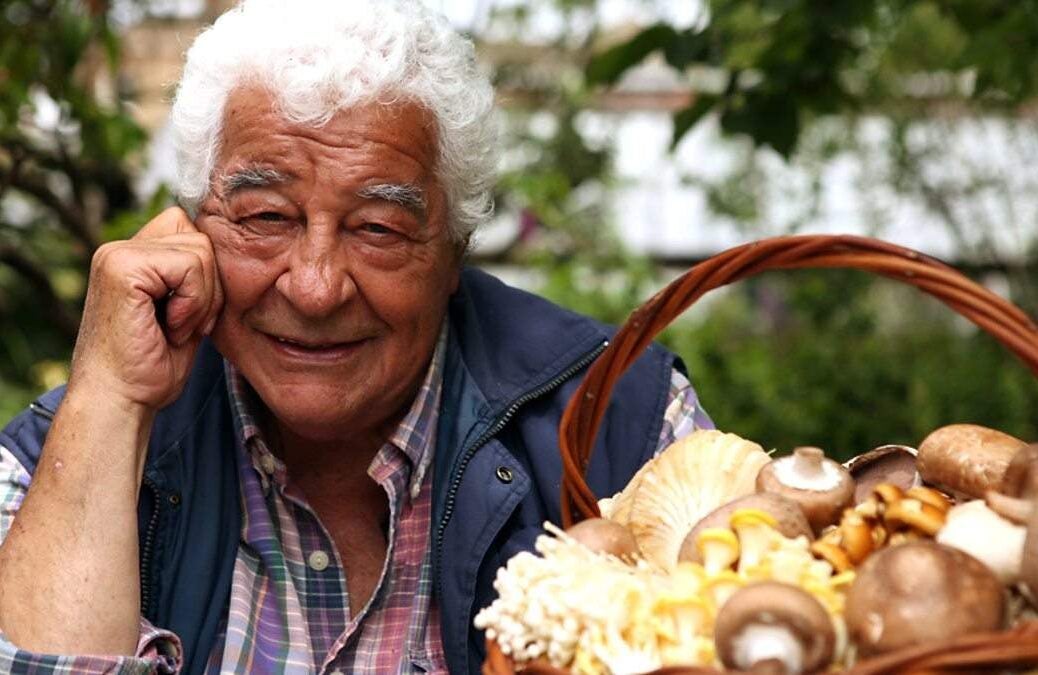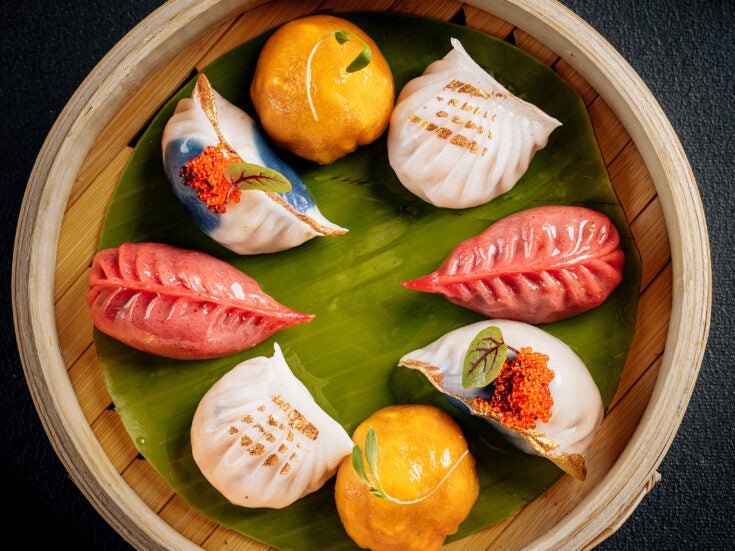
The restaurateur’s European travels ended when he came to the UK in the Seventies and fell in love with our fungal delights, says William Sitwell.
You know when you arrive at the home of Antonio Carluccio because his name is spelt out on the threshold in mosaic tiles. The great Italian cook and mushroom hunter rescued it when his Covent Garden café was relocating.
It adds a sense of permanence to his South London home. Indeed, the 78-year-old has been a firm resident of this country for over 40 years, not that you would believe it when you listen to his accent: pure, deep and fruitily Italian. His voice is untainted by the decades he has spent away from his birthplace.
‘I’m not British, I’m not Italian,’ he says. ‘I’m a citizen of the world. I do feel at home in some parts of Italy, but when my parents died the umbilical cord that attached me to that country was cut for ever. And I did something very special: I took stock of what a nation is. I thought of the countries that I have worked in and visited, and adopted the good things of those nationalities.’ So, according to Carluccio, he has the punctuality and tidiness of a German, the ‘do whatever you like’ (as he puts it) character of an Italian, and the sense of personal freedom and respect for others of an Englishman.
Carluccio tells me this as we sit at a dining table located off his sitting room. He uses the table to work at, and today that means his latest book. He writes in pencil in large notebooks and beside his pile of foolscap notepads is an ashtray filled with white-tipped cigarette butts and a packet of Marlboro. Two other features of the room can’t be missed. Firstly, there is a stack of walking sticks in the corner. For when Carluccio isn’t cooking, writing or painting, he whittles.
‘I whittle,’ he says, confirming it. ‘I have special knives I use from Switzerland.’ If he’s ever stressed, he explains, ‘I do a bit of whittling and I feel fine. If you are a good boy, perhaps when the mushroom time comes I’ll take you out to look for mushrooms and give you a stick.’
So this is where one hobby collides into another. As many may know, Carluccio, who opened his first food shop with his then wife Priscilla in 1991, has another passion, which is mushrooms. Around his house, on virtually every table, mantelpiece and shelf, is mushroom-inspired art. There are tiny models of the smallest fungi, and a huge wooden chanterelle. ‘When people can’t think of what to give me for Christmas or my birthday I get a mushroom,’ he says.
Carluccio came to London after a spell working as a wine merchant in Vienna, where he had gone to add a language to his repertoire. He had considered being a journalist and also worked, for a time, for the typewriter manufacturer Olivetti. But he arrived in London in 1975 and, as someone who had started hunting for mushrooms as a child, he felt he had landed in paradise.
‘1976 was one of the best years for mushrooms,’ he says. ‘They were even growing in Hyde Park.’ He remembers finding a giant puffball by the Albert Memorial. ‘It was in some bushes and looked like a lost football.’ So he picked it and took it to a nearby wine bar. ‘I showed it to them and asked if I could cook it.’ He was shown the kitchen and ‘I sliced and fried it’, he says. ‘It was delicious.’
These days he tends to look for mushrooms ‘towards Hampshire’. ‘I would never tell you exactly where, but I have a permit from Lord Cowdray to look for mushrooms in some woods.’ He has also heard that some of the best mushrooms to be found are on Ministry of Defence land near Farnborough. ‘I’d like to get a permit from them,’ he says with a hint of mischief. But, according to Carluccio, mushrooms are not just a treat to seek out and cook with.
‘Do you know that without mushrooms we couldn’t exist?’ he says. ‘Everything that biodegrades, biodegrades by mushrooms. They are one of the most ancient things that grow on earth. Penicillin is a mushroom. There is even a mushroom that can eat the aluminium on aeroplanes.’ He shows me a photograph of the biggest mushrooms he has ever seen: there are three loaded high in a wheelbarrow. ‘These were in Ukraine,’ he says and adds: ‘near Chernobyl.’
Of the 200,000 varieties, Carluccio knows about 70 and he has so far managed to avoid being poisoned. He’s not interested in the magic variety either.
‘I’m not curious to change my state of mind,’ he says. ‘In fact I gave up alcohol three years ago. The only thing is I smoke — a packet a day — and my doctor says my lungs are all right.’
He claims he doesn’t miss wine, and certainly doesn’t miss the depressing effects of it. ‘I was drinking quite a lot, so now it’s good to have a clear mind all the time.’ He might have a taste from time to time but, he points out, he will never be like Leonardo da Vinci. ‘I saw a menu of his the other day and I discovered that he used to drink Chianti for breakfast.’
Today Carluccio remains a consultant of the Carluccio café chain — there are now 110 in the UK and some overseas in places like Dubai — and when he and Priscilla sold the business they made a tidy £10 million, which they split between them. I ask him if he’s good at business.
‘Me and business are like a cat and dog,’ he answers. ‘When I see examples of successful business people, sometimes I see that they are simply robbers. They often go to lengths that one could say are almost criminal. Yet so many are revered because money rules the world. I have always delegated things like money and accounts to other people. I just try to live a life. I’m still working like mad, but I do things I like to do. And I would never retire, it would be like being dead.’
The great Italian, who has written almost twenty books and presented a great number of TV shows, then takes me into his kitchen. I get a tour of his magnificent copper pans, a huge array of knives, several freezers that store mushrooms, endless packets of dried mushrooms and the occasional kitchen tool that he picks up and asks me what I think it is. ‘This is for grating wasabi,’ he says proffering a piece of wood covered in a whiteish ribbed material with a handle. ‘That’s dried shark.’ He has six stove-top coffee percolators — for one cup or six — and a huge carafe of vinegar. ‘The mother is inside,’ he says of the bacterial substance, ‘and I just top it up with unused wine.’
I leave his house with gifts of rice (‘Acquerello, the best you’ll ever eat’), bottled mushrooms and a tub of his homemade quince paste. The man who created our most famous brand of café/food shops was clearly only doing what comes naturally.
Illustration by Richard Beacham







